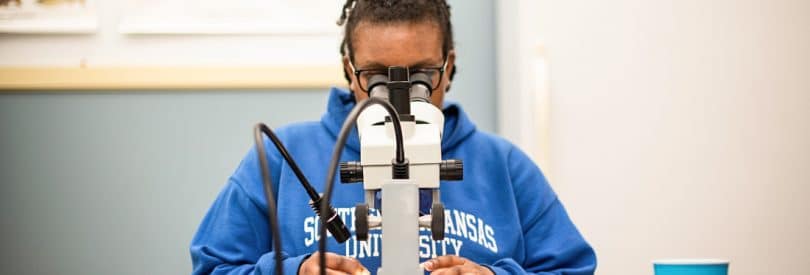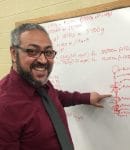
University Requirement (2 hours)
GSTD 1002 – Freshman Seminar
General Education (24 hours)
Note: 11 hours of mathematics, natural science, and physical science requirements are included in the major.
Biology (16 hours)
BIOL 1203 – Principles of Biology I and BIOL 1201 – Principles of Biology I Lab
BIOL 1213 – Principles of Biology II and BIOL 1211 – Principles of Biology II Lab
BIOL 2063 – Anatomy and Physiology I and BIOL 2061 – Anatomy and Physiology I Lab
BIOL 3613 – Microbiology for Nursing and Allied Health and BIOL 3611 – Microbiology for Nursing and Allied Health Lab
Chemistry (24 hours)
CHEM 1501 – Background and Strategies in Chemistry (BASIC)
CHEM 1023 – University Chemistry I and CHEM 1021 – University Chemistry I Lab
CHEM 1123 – University Chemistry II and CHEM 1121 – University Chemistry II Lab
CHEM 2012 – Analytical Chemistry and CHEM 2001 – Analytical Chemistry Lab
CHEM 3003 – Organic Chemistry I and CHEM 3001 – Organic Chemistry I Lab
Select 4 hours from the following:
CHEM 3313 – Instrumentation I and CHEM 3311 – Instrumentation I Lab
CHEM 4313 – Instrumentation II and CHEM 4311 – Instrumentation II Lab
Select 4 hours from the following:
CHEM 3073 – Biochemistry I and CHEM 3071 – Biochemistry I Lab
CHEM 3103 – Organic Chemistry II and CHEM 3101 – Organic Chemistry II Lab
Mathematics (6 hours)
MATH 1023 – College Algebra
3 hours of statistics or a higher-level math course
Electives (9 hours)
9 hours of unrestricted electives
Recommended electives include courses in chemistry and biology (consult with advisor). Chemistry coursework in biochemistry is very strongly encouraged. Coursework in medical terminology, genetics, and public speaking are also encouraged. Elective hours should be used to complete any specific entrance requirements for desired clinical programs. These entrance requirements vary from program to program.
Clinical/Professional Program (39 hours)
39 hours of coursework at an approved, accredited medical technology program, including satisfactory completion of at least 12 months of clinical training
Total Hours – 120
- 2025-2026
- 2024-2025
- 2023-2024 [pdf]
- 2022-2023 [pdf]
- 2021-2022 [pdf]
- 2020-2021 [pdf]
- 2019-2020 [pdf]
- 2018-2019 [pdf]
- 2015-2016 [pdf]
- 2014-2015 [pdf]
- 2013-2014 [pdf]
- 2012-2013 [pdf]
Dr. Gija Geme
Professor of Chemistry/ NRRC Director
Biochemistry & Chemistry, NRRC
gijageme@saumag.edu
870-235-5342
| Department: | |
| Hours Required: | 120 |
| Categories: | Major, Undergraduate |
| Delivery: | On-Campus |
In this degree program students complete prerequisite coursework in preparation for a medical laboratory science program. Upon proof of completion of the 40 hours of clinical work at a medical laboratory program, students can apply for graduation from Southern Arkansas University.
Students in this major receive training to be medical technology technicians. Such careers include work in hospital and clinic laboratories, along with other medical laboratory areas (X-ray, radiology, nuclear medicine, ultrasound, etc.).
We are a program affiliate with Baptist Health College Little Rock Medical Laboratory Science Program.
SAU Advisor: Dr. Scott White
Jennie Manees, M.PH., MT(ASCP) Baptist Health College Program Director, adjunct instructor
Learning Goals
- Our graduates effectively communicate scientific knowledge.
- Our graduates have the knowledge to make informed and ethical scientific decisions.
- Our graduates utilize appropriate quantitative skills in making decisions.
- Our graduates demonstrate the information literacy required for scientific study.
- Our graduates possess the knowledge and skills in the physical sciences to be successful.
Program Contact
Dr. Tim Schroeder
Department Chair
Biochemistry and Chemistry
tsschroeder@saumag.edu
870-235-4277



